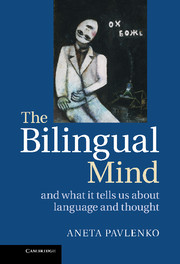Book contents
- Frontmatter
- Contents
- List of Tables
- Acknowledgments
- Preface
- 1 The Sapir-Whorf hypothesis and the bilingual turn in the study of language and cognition
- 2 Material worlds
- 3 Multidimensional worlds
- 4 Dynamic worlds
- 5 Narrative worlds
- 6 Discursive worlds
- 7 Emotional worlds
- 8 The bilingual mind and what it tells us about language and cognition
- References
- Author index
- Subject index
8 - The bilingual mind and what it tells us about language and cognition
Some renegade thoughts
Published online by Cambridge University Press: 05 June 2014
- Frontmatter
- Contents
- List of Tables
- Acknowledgments
- Preface
- 1 The Sapir-Whorf hypothesis and the bilingual turn in the study of language and cognition
- 2 Material worlds
- 3 Multidimensional worlds
- 4 Dynamic worlds
- 5 Narrative worlds
- 6 Discursive worlds
- 7 Emotional worlds
- 8 The bilingual mind and what it tells us about language and cognition
- References
- Author index
- Subject index
Summary
For my purposes … the ultimate validity of the Sapir-Whorf hypothesis is irrelevant. What is crucial is that many bilinguals relate to their languages in ways that enact some version of this hypothesis. What may not be true for Spanish and English in any objectively demonstrable way may be true for an individual’s apprehension of Spanish and English.
Pérez Firmat, 2003: 13Spanish–English bilingual writer and scholar Gustavo Pérez Firmat (2003) urges us to cease worrying about the empirical validity of the SWH, because it is immaterial to bilinguals’ lives – what matters is its ecological validity. I agree and in the preceding chapters I have tried to pinpoint the sources of such experiential relativity, from language tagging in autobiographical memory, to the change in the language of inner speech and interpretive frames, to differences in affective processing. But I will also do one better and argue that there is no such thing as ‘the ultimate validity of the Sapir-Whorf hypothesis’. I apologize to those who expected me to take a stand on the SWH and to occupy a recognizable position: ‘for’, ‘against’, or ‘rationally in the middle’. I refuse to play this game and to accept the narrow and binary terms of engagement articulated by Brown and Lenneberg, for I do not find them either interesting or meaningful. The SWH ‘as we know it’ is a phantom, if not a fraud, that has little to do with the questions and concerns that preoccupied Sapir and Whorf. It is also a pattern of habitual thought, an implicit agreement on certain terms of engagement that is begging to be disrupted because it fails to address the very question it purports to address, namely, the implications of our dependence on languages as semiotic tools. The paradigm change, prompted by bilingual and evolutionary turns in cognitive science, requires a fresh re-reading of Humboldt, Sapir, and Whorf – and possibly also Vygotsky and Bakhtin – and reconsideration of ‘Whorfian effects’ of three kinds.
Information
- Type
- Chapter
- Information
- The Bilingual MindAnd What it Tells Us about Language and Thought, pp. 299 - 315Publisher: Cambridge University PressPrint publication year: 2014
Accessibility standard: Unknown
Why this information is here
This section outlines the accessibility features of this content - including support for screen readers, full keyboard navigation and high-contrast display options. This may not be relevant for you.Accessibility Information
- 1
- Cited by
